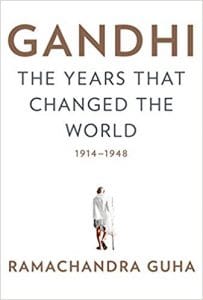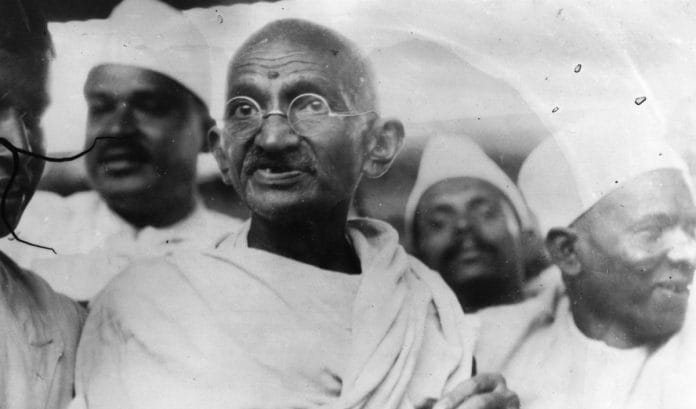This excerpt from ‘Gandhi: The years that changed the world 1914-1948’ by Ramachandra Guha tells the story of the Mahatma in the months leading up to Partition.
While urging ordinary Hindus to repent and make amends, Gandhi continued to have reservations about the Muslim leadership. ‘If you are true representatives of the League,’ he told Muslim League functionaries in Bihar, ‘you should frankly tell Jinnah Saheb or Liaquat Ali Saheb that they are going in the wrong direction; only then you would be serving the League faithfully. Noakhali, Bengal and the Punjab are still witnessing massacres by Muslims. I do not deny that Hindus too are perpetrating such crimes, but both Jawaharlal and I have been strongly condemning their misdeeds and publicly appealing to them to desist. Has any representative of the League made any such appeal to Muslims?’ The criticism, or complaint, was not without foundation: Jinnah and his second in command, Liaquat Ali Khan, were by no means as forthright in speaking out against Muslim communalism as were Gandhi and Nehru with regard to Hindu communalism.
Negotiations regarding the transfer of power were reaching a crucial stage. Nehru and Patel thus wanted Gandhi back in Delhi. He returned to the capital for a week, consulting with leading Congressmen, and also meeting Mountbatten and Jinnah. It now looked more and more likely that, when the British left, they would leave behind not one nation but two. Jinnah’s campaign for Pakistan was on the verge of success. Gandhi still hoped it would not come about; arguing that ‘the Congress should in no circumstance be party to partition’.
Gandhi met Jinnah in Delhi on 6 May; afterwards, the League leader issued a statement saying that Gandhi ‘thinks division is not inevitable, whereas in my opinion, not only is Pakistan inevitable but this is the only practical solution of India’s political problem’. But Gandhi yet hoped to stall the inevitable; writing to the viceroy that ‘it would be a blunder of the first magnitude for the British to be a party in any way whatsoever to the division of India’.
In truth, the increasing polarization was manifest at Gandhi’s own prayer meetings, with many Hindus objecting to the recital of verses from the Koran. One correspondent wrote saying the Koran’s philosophy ‘is an anti-thesis of all the Gita teaches’. Gandhi’s reading of these verses, charged the critic, was an ‘expression’ of his ‘appeasement policy’. Another writer sarcastically commented that ‘in order to support the Congress, the Hindu need not become an ardent admirer of the “Quran” or allow it to be sung [sic] at his place of worship’. If this practice continued, he warned, ‘the Congress will cease to exist as the Hindus are no longer in a mood to be treated in the way they have been’.
From Delhi, Gandhi proceeded to Calcutta, where a movement had arisen for a ‘united Bengal’, for a state that would not join Pakistan but unite Bengali speakers regardless of religious affiliation. Among its chief advocates were Subhas Bose’s younger brother Sarat Chandra Bose and H.S. Suhrawardy. On the other hand, it was opposed by the Hindu Mahasabha leader Syama Prasad Mookerjee, who claimed it was promoted largely by British commercial interests. The scheme was also rejected by the Muslim League, for whom Bengal was as big a prize for Pakistan as the Punjab. Gandhi met both proponents and opponents of the idea. While he did not commit himself to either side, the idea of unity on the basis of ‘a common culture and a common mother tongue’ appealed to him. But, as he told Sarat Bose, the proposal had to be put to the democratic test of the citizens of Bengal. However, Nehru and Patel also came out against the United Bengal scheme, so, as Gandhi wrote to Bose, he would now have to persuade both the Congress and the League, an impossible task.
Gandhi moved on to Patna again, talking to citizens and volunteers, pursuing his campaign for communal harmony. He was disappointed by the lack of commitment of Congressmen to ‘establishing good relations among the Hindus and the Muslims’. He struck a note of despair, saying, ‘a rot has set in in the Congress. It means that Congressmen are no longer honest. If those who are selfish capture the Congress it cannot function well.’
In the last week of May, Gandhi returned to Delhi. His prayer meetings were now regularly obstructed by protesters. These were often Hindu refugees from West Punjab, thrown out of their homes and villages as the violence in the province grew progressively more intense. Gandhi was also receiving many abusive letters. As was his wont, he read out excerpts from these letters in these meetings. He did not contest their facts, while pointing out that no one could cast the first stone, since ‘the Hindus in Bihar have not lagged behind in committing atrocities. Not only were the atrocities of Noakhali avenged, but much more was done.’ On the other side, ‘we shall have to tell the Muslims that [violence] is not the way to achieve Pakistan’.
Partition had now become inevitable. On 3 June, Mountbatten announced that the British government had recommended that British India be divided into two successor states, India and Pakistan, both remaining in the British Commonwealth, but retaining the right to secede from it. The 15th of August was set as the date of formal transfer of power. British India was to be partitioned; so too would be two of its largest provinces, Bengal and the Punjab. Cyril Radcliffe, a British judge with no previous experience of India and Indians, was tasked with drawing the line that divided India from Pakistan in the east and in the west.
Once Pakistan came into being, said Gandhi at a prayer meeting on 7 June, then ‘it becomes the duty of the Congress to… make its best efforts in the portion that remains with it. Let the people in Pakistan go ahead of the Congress in their efforts to bring progress to their land.’ Five days later, he remarked that ‘geographically we may have been divided. But so long as hearts too have not been divided, we must not weep.’ Four days later still, he insisted that even if Pakistan and India became two different countries, ‘if I have to go to the Punjab, I am not going to ask for a passport. And I shall go to Sind also without a passport and I shall go on walking. Nobody can stop me.’
Gandhi urged his audiences to ensure that those Muslims who stayed back in India were treated as full citizens. Their safety and security must be assured. At the same time, there was no question of separate electorates for Muslims. Those electorates ‘were a poisonous weed planted by the British but we shall be just to them. Their children will have as much opportunity of education as other children.’
Through the second quarter of 1947, the situation in the Punjab continued to deteriorate. The province was ‘submerged under suspicion and hatred’, wrote one Punjabi: ‘Passions are running high. Killings, loot, arson, abductions and forcible conversions have hardened the people. All classes of men are feverishly arming themselves.’ The governor of the Punjab threw up his hands, writing to a colleague in late May, as houses and localities were being set ablaze in Lahore, that ‘we haven’t the water or the fire-engines to exercise more than a very elementary control. No answer that HMG [His Majesty’s Government] can devise will really meet the Punjab situation . . .’
Gandhi was reading the newspapers, and getting reports from Congressmen in the province. ‘Is Pakistan,’ he asked, ‘to be raised over the ashes of Lahore and Amritsar?’ He found himself in a dilemma. Punjab called, but so did Bihar, and so also Noakhali, where his ‘work was just started and [had] given much comfort to the Hindus’.
In a prayer meeting on 10 July, Gandhi said: ‘There are still thirty five days to August 15. Let us cease to be beasts and become men. We have all been put to the test and that includes the British.’ He had heard that, in Noakhali, Hindu refugees worried that once Pakistan came into being, they would not be resettled or compensated. Gandhi insisted that ‘the Pakistanis must demonstrate that the Hindus living in Pakistan will not be harmed in any way. Then we shall have reason to celebrate 15th of August as Independence Day. But if this does not happen, this independence is not for me nor, I am sure will it be for you. A lot can happen in these thirty-five days.’
In another prayer meeting two weeks later, Gandhi said that after Partition, ‘the Congress can never become an organization of the Hindus. Those who seek to make it such will be doing great harm to India and Hinduism.’ Muslims, Christians, Sikhs, Parsis who lived in India would have equal rights. For, ‘people professing different religions have mingled to form the Indian nation and they are all citizens of India and no section has the right to oppress another section’.
Also read: Mahatma Gandhi’s little-known love affair with a married, progressive woman in Lahore
The creation of Pakistan was a great personal triumph for Muhammad Ali Jinnah. His idea of a separate nation for Indian Muslims had been widely scoffed at and mocked. As recently as 1942, Jawaharlal Nehru had written:
Hindu and Muslim ‘cultures’ and the ‘Muslim nation’—how these words open out fascinating vistas of past history and present and future speculation! The Muslim nation in India—a nation within a nation, and not even compact, but vague, spread out, indeterminate. Politically the idea is absurd, economically it is fantastic; it is hardly worth considering.
Within five years of this magisterial dismissal, this absurd and fantastic idea had been fulfilled, albeit at a horrific human cost. Did Jinnah think it worth the price? We do not know, since his feelings on the division of India were, unlike Gandhi’s, not shared with the public. Meanwhile, Penderel Moon cynically wrote to a friend: ‘One man with two stenographers having created two kingdoms—J’s [Jinnah’s] own description of his achievement. He is apparently quite satisfied and doesn’t much mind if they both go to blazes…’
 This excerpt from ‘Gandhi: The years that changed the world 1914-1948’ written by Ramachandra Guha has been published with due permission from Penguin Random House.
This excerpt from ‘Gandhi: The years that changed the world 1914-1948’ written by Ramachandra Guha has been published with due permission from Penguin Random House.







Jinnah was right.He safeguarded muslim interests by making pakistan.
Otherwise incidents like lynchings,demolition of babri,,Gujrat carnagewould have happened in mixed areas under the supervision of a Hindu dominated central govt…